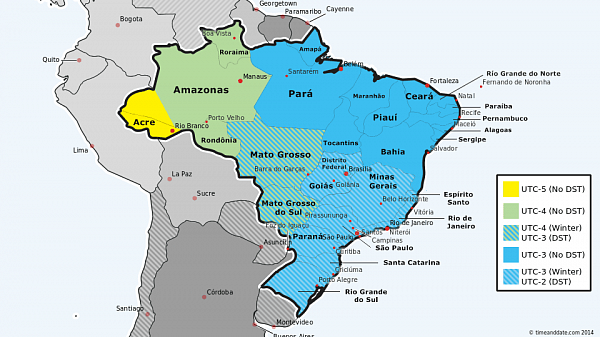Brazil Starts DST Sunday, October 18, 2015
On Sunday, October 18, 2015, clocks in parts of Brazil will be set forward one hour from 00:00 (midnight) to 01:00 (1 am) local time as Daylight Saving Time (DST) starts.

DST in Brazil starts on October 18, 2015.
Ends in February 2016
DST ends again Sunday, February 21, 2016, 00:00 (midnight) as clocks are turned backward one hour to 23:00 (11 pm) local time.
Brazilian States With DST
The majority of Brazilian states will use Daylight Saving Time in 2015/2016:
- Sao Paulo, São Paulo
- Rio de Janeiro, Rio de Janeiro
- Brasilia, Distrito Federal
- Florianópolis, Santa Catarina
- Curitiba, Paraná
- Goiânia, Goiás
- Porto Alegre, Rio Grande do Sul
- Campo Grande, Mato Grosso Do Sul
- Vitória, Espírito Santo
- Belo Horizonte, Minas Gerais
- Cuiabá, Mato Grosso (some exceptions)
Brazilian Regions Without DST
Several Brazilian regions remain on standard time all year and don't use DST at all. These include: Amazonas, Pernambuco, Bahia, Sergipe, Pará, Paraíba, Ceará, Amapá, Alagoas, Rondônia, Rio Grande do Norte, Piauí, Maranhão, Acre, Roraima, Tocantins, and some regions of Mato Grosso.
Four Time Zones in Brazil
Brazil has four time zones, stretching from UTC-2 to UTC-5 (standard time).
- UTC-2: includes areas such as the archipelago of Fernando de Noronha.
- UTC-3: this is largest time zone, comprising eastern and central areas, and including all states bordering the Atlantic coast (except some islands), from Pará and Amapá in the north to Rio Grande do Sul in the South; includes the Brazilian Federal District with the capital Brasilia.
- UTC-4: includes the states of Mato Grosso, Mato Grosso do Sul, Rondônia, Roraima, and most of Amazonas.
- UTC-5: comprises the state of Acre and the westernmost part of Amazonas (west of Tabatinga / Porto Acre).
Daylight Saving Time – DST
- One Hour Back or Forward?
- What Is Standard Time?
- Savings or Saving?
- Pros and Cons of DST
- Your Health and DST
- Is Summer Time the Same as DST?
- Winter Time or Standard Time?
- History of DST
- DST in the USA
- DST in Europe
- History of DST in Europe
- How Does DST Work?
- DST Statistics
- Circadian Rhythm: Your Body’s Master Clock
- Babies and DST